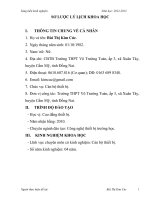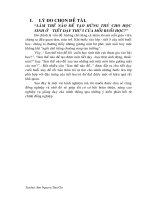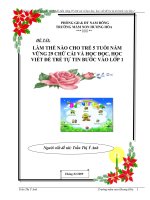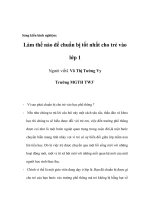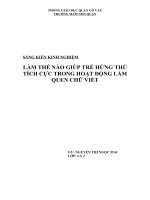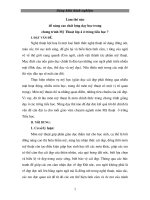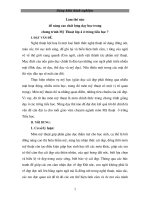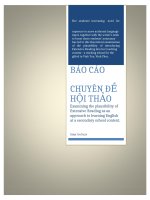(Sáng kiến kinh nghiệm) practicing the vocabulary of english 6,7,8(new)
Bạn đang xem bản rút gọn của tài liệu. Xem và tải ngay bản đầy đủ của tài liệu tại đây (2.51 MB, 21 trang )
I. INTRODUCTION
1. The reason for choosing the topic.
As we know, English is an important language, commonly used world-wide
and is used in different fields. In the national construction, development and
integration with the world, English has become a vital tool, work tool and
communicative tool between all of the modern people, it is an important second
language after their mother tongue. Teaching English from secondary schools is
very necessary and contributes to the education of the younger generation to
become comprehensive people. English learners have the opportunity to learn,
access to the rich, fascinating culture of oldest countries in the world. In our
country, English is considered the language of transaction in economics, politics,
culture, and has been teaching at the elementary, secondary, college, university ...
In process of learning English, we know more in another language, a different
culture and also more love Vietnamese and Vietnamese culture. To use English as
a language of communication, we not only need to master the rules of grammar,
have good listening skills, have knowledge of the language but also to have a
number of diversified, rich lexical. In teaching and learning English, vocabulary is
one of three elements forming the system of language knowledge, it is the mean
and condition of formation and development of communication skills. In any
language, the role of vocabulary is also very important. It is possible that a
language is a subset of the vocabulary. We can not understand the language
without understanding the vocabulary, or lexical units. Thus, learning and
practicing vocabulary skills is the leading factor in the transmission of a passive
and receptive language in general and English in particular. Because vocabulary is
a language unit so it is expressed in two forms: speech and handwriting. If you
want to use a foreign language, that is, you must master the expressive forms from
the verbal and writing. But due to the association of words with the other elements
of language (grammar, pronunciation, intonation ...) or in social situations, many
researchers believe that to build a wall language vocabulary is the "bricks" and the
grammar and sentence structure as "grout" to mount the brick wall creates
language. Without a vocabulary necessary, students can not use the sentence
structure and the function of language in communication.
From the above reasons, I have researched and applied effectively the experience
initiatives "Practicing the vocabulary of English 6,7,8 (new)" and I am pleased to
present to you. Due to the limited time and limited experience, my initiative should not
be experienced as unwanted, I am looking forward to your contributions to my ideas.
2. The purpose of research.
1
Helping students at Thach Binh secondary schools learn English better through the
activities of learning the vocabulary.
3. Study subjects.
Research subjects are students in grades 6,7 and 8 (new) of Thach Binh
Secondary School, school year 2015-2016 and 2016-2017.
4. Methods :
With this topic I have applied the following methodology :
+ Observe students
+ Interview with students
+ Check and compare learning results of student.
+ Discuss with teachers and reference textbooks
After each lesson I have assessment in the form of implementation of each period ,
then analyze the goods to maintain, continue improving to reduce
students’limitations for the next lesson.
Through many the lessons I have chosen and find out the best forms and infer
useful experience.
II. CONTENT OF THE THEME :
1. The basis issues
Vocabulary is one of the tools people use to think, express ideas, emotions
and learn about the world, is the foundation for all development skills such as
reading comprehension, listening comprehension, speaking, writing, ... It is also
the major tool that help students use English effectively. Indeed, when talking to a
native English speaking person, watch a movie without English subtitles, listening
to a favorite song or read English documents, ... we will always be exposed to from
vocabulary.
A famous linguist once said if we does not learn grammar well,we can still
achieve something, but if we do not have the vocabulary, we wouldn’t able to
express anything at all. Native speakers can understand the article correctly use
vocabulary that is not grammatically correct. However, they will not understand
grammatically correct article, but do not use the exact words.
A reality show, Vietnam students learning English often encounter
obstacles in how to speak English fluently. They often find it difficult to
participate in activities related to the speaking skill, because they only use a few
repetitive structures and vocabulary. Thus, their communication was interrupted
abruptly early due to lack of vocabulary.
In short, if they do not have the vocabulary skills, their listening, speaking,
reading and writing skill will not be developed. If you do not have enough
vocabulary, the people will have problems, even failure in communication.
Recognizing the importance of this, today all applicable methods in teaching are
focused to teach vocabulary. And start learning English is always associated with
learning vocabulary.
2
Therefore, in the teaching process I thought about how students acquire
vocabulary best to help students create the atmosphere lively language learning,
help them remember the lessons from the right in, from which they can more easily
use the word in the communication process.
2. The reality of the research
a. Reality:
a.1. Advantages:
Thach Binh Secondary School is the National Standard, my school has a
total of 09 classes with 315 students.
The School Management is particularly interested in teaching and learning
English in school.
Program content textbooks appropriate, closer to the daily life of students
with many beautiful pictures, eye-catching, so the program have generated
excitement in learning for students.
The development of information technology and Internet can help teachers
easily find the resources to support teaching via the Internet.
The teacher has a high sense of responsibility and enthusiasm in teaching,
reach the Standard level B2.
a.2. Difficulties:
Through practical teaching of English in secondary school fifteen years ago,
I found this course quality is still low due to several reasons:
Limitation of teaching equipment:
Thach Binh Secondary School has less visual aids for teaching and
learning. The school does not have audio-visual classrooms dedicated to learning
English. The procurement of equipment for self-study English in their family’s
students will be extremely difficult, not every family can afford.
Opportunities to practice English not much:
My school is located in a small commune, students don’t apply what they have
learned to everyday life. The children should not be exposed to foreigners to
practice English. Scope of practice English is done only in the classroom
hours. Therefore, they always feel that learning English is mandatory, just learn to
get points but they are not aware of learning English as a tool to communicate.
Limitation of time and form of organization of the activities in class:
Secondary students are very active, inquisitive but also very quickly
bored. The school alone will make you feel very monotonous lessons, so they
would love learning while playing, learning that the school play-play. However
they are small, their writing speed very slow leading to limited time to organize
other activities interfere simple as learning to sing, play the game ... Also, if you
have the time to organize activities that was not rich.
Low motor and awareness of learning: English is a pricipal subject in
secondary school, so some students and even their parents are not aware of the
3
importance of learning English. A number of children attending school is
mandatory, they have no motivation in the learning process. In fact, English is a
new course for secondary school students, so they can not avoid the initial surprise,
besides that this is a difficult course with the sound and strange writing that they
can not avoid certain difficulties. First, they are excited with the subject but
gradually, due to the amount of knowledge and increasingly more and more
difficult, if they themselves don’t study actively, they vill not understand the
lessons, this will lead to their depression, and they will not want to learn. Also a
special reason why they have psychological problems because of the school's
English-speaking children do not read well. In fact, when I teach this subject, I
found that a good talk, a good read for secondary students, is not so easy because
the remembering of the new words and phrases in the English lessons is very
difficult, especially for secondary school students in general and students in Thach
Binh Secondary School in particular. The slow reading and writing of secondary
students is the cause of this situation, the retention of the children is not reliable
and not deep, forgotten homework right after the previous post, most of them are
not bold and flexible in applying what was learned to communicate with each other
during school hours or during everyday activities.
b. Result and effect of the current reality
I studied the method of teaching vocabulary for students at Thach Binh
Secondary School.
Initially, through the monitor of the students’ studying, I realied that the students
were afraid of learning English vocabulary, they were very worried when I checked
the vocabulary of the previous lessons.
At the end of the first semester (mid-December) of Academic Year 2015- 2016, I
had made some small tests of vocabulary :
Grade 8: (Unit 5) Reorder the letters (3)
icnesen
pary
ofernfigs
Inerants
4
csrwod
cehergin
Grade 6: (Unit 8) Look at the pictures. Complete the words (3)
5.
1.
Sp…rt
sho…s
Ra…ket
6.
2.
B…at
…kis
7.
3.
Sk…teboa…t
4.
Bic…cle
8.
Gog…les
….all
Grade 7 (Unit 9) Complete the sentences with the correct form of the
words in bracketss. (3)
1. A lot of ……….and artistic activities are held as part of the Flower
Festival in Da Lat. (Culture)
2. I saw a ….of flower floats when I attended the festival last year. (parade)
3. We had a ….meal on my grandfather’s birthday. (Celebrate)
4. The Christmas season is also called the season. (Festival)
5
5. I loved the…..of folk songs. (Perform)
6. There is a special….for Japanese girls on March 3rd every year.
(Celebrate)
And I obtained the following results:
Table 1: Survey Results of grades 6, 7, 8.
Grade
Total
6
7
8
70
88
78
Good
Number
6
9
8
Fair
%
8,6
10,2
10,3
Number
20
22
20
Medium
%
28,6
25,0
25,6
Number
33
42
48
%
47,1
47,8
48,7
Weak
Number
11
15
12
%
15,7
17,0
15,4
Through the survey, I found the quality of their learning is not as satisfactory
as I expected, the number of students achieving good results is low, the number of
students with weak results is even higher. From that result, I presume to give you
some tips to teach English vocabulary and to improve students’ learning. And I
want to introduce with you "some tricks to teach vocabulary for students" to
consult with colleagues.
3. The solution implemented
Solution 1: Apply all forms that help students to remember new words fast,
pronounce correctly after each class lesson.
Solution 2: Apply the new and flexible method to organize the rich and
diversified lessons to inspire students, help them to acquire all the better.
Solution 3: Apply information technology and visual aids use utensils
thoroughly the lessons.
Solution 4: Regularly inspect and evaluate the learning outcomes of
students to grasp timely the extent of students’ acquirability and memorability of
their knowledge, from which I can give timely adjustments in the teaching process.
Solution 5: Consult with School Menagement to built foreign language
classrooms and to buy more facilities for language learning.
4. Measures carried out:
From practical teaching, I myself really thought how can make students to
be interested in learning , how can make them to realize that learning English is not
heavy pressure, so they learn better and especially they can remember new words
faster, easier, longer ..., I gave some tips, ways to teach vocabulary for secondary
students.
4.1. Teaching vocabulary through songs, poems
No one can deny the important influence of the music and poetry of human
life. Most everyone loves music. It's always with people whether that person happy
or sad. It appears everywhere, all the time to share joy or sadness relieve when we
need to. Futhermore, poetry-music can increase concentration, enhance memory,
makes people closer together, creating motivation and joy in learning, makes
people relax when they are depressed or stress, ...
6
Because of the tremendous value that brings poetry to music, it has been
used as educators useful tool in teaching. And now the use of songs, poetry as a
tool to support the learning of foreign languages is quite common. Just a few tunes
of the song, students can learn the culture of authentic language, vocabulary,
grammar, listening skills, and a variety of other skills.
Using song and poem in class can make the classroom atmosphere becomes
fun and dynamic. Students will not feel stressed, even scared like to speak English
in class solemn atmosphere. It is this will make them feel really excited and
voluntary participation in classroom activities.
The songs, poems not only create excitement for student learning, but also
contains elements of very rich language including pronunciation, vocabulary,
grammar ...
The songs, poetry can help students to learn about pronunciation. For
learners of English in general and in particular primary school students, there’re
some sound that are very difficult to imitate because our mother tongue does not
have this sound such as: /ð/, /θ/, /æ/,... Therefore, you must learn how to pronounce
inflexibly that can still not pronounce. The wrong pronunciation can change the
meaning of the phrase, will not lead to communication results, because listeners
misinterpreted the transmission of information. Songs, poems can help them
overcome this. The melody of the song, the rhythm of the poem often repeated a
similar sound. When they heard many times, they will indirectly be told how to
pronounce the sound that makes you remember them and eventually the correct
pronunciation.
Some activities to learn vocabulary associated with songs, poems to
promote motor learning for students:
- Gap-filling: First, I give the students lyrics, poems have been vacant for a
number of positions. they heard the first to grasp the content of the post. Then hear
from a second to fill in the blanks as much as possible. The third time, they listen
to check if you have correctly filled. This type of exercise is useful when teaching
vocabulary by topic.
- Get some words from the songs, the poems.
Step 1: Write some random words on the board. Students exchange with
each other about what the words mean.
Step 2: Students divide into groups of three to four people quickly memorize
the words.
Step 3: Turn on the song or the poem, student must speak loudly "Stop"
when they hear one of those words.
- Spelling: For some simple post, I ask them to hear and copy the words.
- Circle synonyms, antonyms with given words: In this case, I give a few
words with the same or antonyms words in poems or songs to the board, in the
process of hearing, they must circle the synonymsor antonyms of the words given.
- Circle the correct word with its meaning: I offer a number of Vietnamese,
they would circle the meaning of English words in such poems or songs or vice
versa.
7
4.2. Teaching vocabulary through the use of visual maps, through
pictures, picture collage or through gestures, posture ...
Secondary students are very active, they enjoyed exploring visual
exploration; visual effects. With nature curious, eager to learn and the ability to
perceive the visual world from vivid to abstract thinking, children are especially
excited when the teacher preparation utensils or right visual objects the classroom.
For example, when teaching the word "ball", I directly put the ball on the
table. Or just give them the difference between the word "desk" and "table" with
the goal of learning and I sat on the desk of the classroom teacher. With the
topic "school", I use directly the school supplies of students to teach vocabulary;
they are very excited and elated.
In addition, I also introduce new words by using gestures act, gesture or
express facial expression ...
For example: I walk while saying: "I'm walking" or use a cup-sized gestures
as drinking water said: "I'm drinking" or my students and I dance toghether and we
talk "I can dane - I can dance ..." in chorus.
To introduce the phrase "open the book" - "close the book", I said while
opening or closing a book.
Or to introduce the word "stomachache", I hug belly, bending down with
shriveled face.
Thus, students will not only quickly memorize new words but also know
how to recognize the status of others and how to express their status.
For difficult words or phrases, I can prepare visual gadget, I use pictures or
using the projector, so that students can directly observe the image, thereby the
remembering of new words is easier.In the process of teaching vocabulary, I also
emphasize the correct pronunciation from using the media as robot
teacher support, tape, disk.... with the hope my students can speak English like a
native speaker .
4.3. Teaching vocabulary through the use of language learning:
- Use definition, description: Sometimes, to avoid repeating, I change the
way of teaching and learning by giving definitions, descriptions and students
predict the meaning of words..
For example: I give students the concept of "the thing which, when you look
at, you will see your own image", they immediately shouted, "Cai guong" with a
very excited voice, then I give children the word "miror".
- Use synonyms, antonyms:
For example, when teaching the word "small", I put the antonyms of
it "big" – or with the teaching of "large", I made it a synonym of "big". The
children very quickly figure out the meaning of words that I want to teach.
- Guess the meaning of words through context:
For example: I give students a situation: This morning your mother was very
busy, she couldn’t take you to school, so you must walk. On the way to school, you
picked flowers, chased butterflies...Suddenly, you looked back the clock, only a few
8
minutes, the school gate vill be closed,, how do you come to school on time so
fast?
Students did not hesitate to answer: “Em chay!”
I give the word: “run”.
As such, students will know the meaning of the words and will remember
the new words in an active way.
- Translate the words into the native language: (5)
For the abstract noun, I always put Vietnamese meaning to avoid wasting
time and help Ss to understand more easier.
Normally, in a lesson, there will always be some new words. But each words
will have a different way of teaching. Therefore, the selection of teaching method.
is an important task for teachers.
4.4. Teaching vocabulary through practical training
In the process of teaching vocabulary I often organize activities to practice
and reinforce training words temperate through listening, speaking, reading and
writing to increase fluency when students use words. These activities will help
students focus on the identification and proficient use of the learned words in each
context.
Along with that, I myself always focused on the role of students in teaching
and learning vocabulary. I always encourage them to participate actively in the
learning process through a long and continuous.
4.5. Teaching vocabulary through the use of dictionary
In addition to the above methods and guides I also encourage students to use
the dictionary especially visual dictionary or the glossary in their textbooks becase
dictionary is an effective means for learning vocabulary. The guide of use
dictionary will help students to improve their ability to learn themselves and help
teachers teach vocabulary more efficient.
4.6. Teaching vocabulary through games (1) + (2)
In the process of teaching, I found stimulating interest of students’ learning
is not difficult, but how make them inculcated knowledge is not simple at all. At
this age, children are eager to explore, to discover, but very soon forget.
Therefore, I am always aware how to the class are always fresh and vivid, th
classroom atmosphere is always fun. In my opinion, the classes take place gently in
order to create comfortable psychologie for children, from there, they will
memorize easily vocabulary and knowledge.
I regularly change the activities in class by organizing games for the
children. These activities are integrated into the process of transmitting knowledge
that they are not getting cornered knowledge, passively from the teacher, they will
always feel the real lesson funky, lively, attractive and always look forward to
English periods.
Here are some tricks I use the games summed up in my process of teaching
with the aim of helping students increase and memorize English vocabulary in the
9
most natural way. I often have students play games in the Warm-up, Free-Practice,
after finishing teaching new word.
4.7. Slap the board: (2) + (5)
- The purpose of this game is to help students remember the words and the
pronunciation of words and demonstrate their agility and dynamic.
- Select the 2 groups of players ( 12 students). Students arrange in two rows.
- Give each group a plastic toy hammer.
- Paste the picture cards (depending on the number of lesson units) on the board.
- Read aloud a word from the card of stickers. Students listen to the word the
teacher read, the two first students run up the board to touch the painting's meaning
of the card they has heard, and then they go back to their place, put the hammer to
the nex person, the touching word right before will be a point. And so to all views.
For example: Unit 7 - English 7 : (3) Review the words:
making models
ice-skating
making pottery/
Carving wood
carving eggshell
4.8. Matching:
- The purpose of this game is to help students review vocabulary by
matching words to pictures when connected, words to words ......
Example 1: Match the words to pictures: Unit 5 – English 6 (new) (3)
10
1.
a. lake
2.
b. mountain
3.
c. valley
4.
d. cave
5.
e. desert
6.
f. forest
7.
g. river
11
8.
h. waterfall
Example 2: Match the words with its meaning: Unit 2 - English 7
A
B
1. Cough
a. đau họng
2. Headache
b. bị sốt
3. Sore throat
c. cúm
4. Temperature
d. đau bụng
5. Flu
e. ho
6. Stomachache
f. đau đầu
4.9. Jumbled words: (2) + (5)
- The purpose of this game is to help students remember words and spelling
words.
- Offer some words with the letters disturbed.
- Ask students to rearrange to form meaningful words.
- Students can do the task in groups, in pairs or individuals.
Example : Unit 1: Health –
English 7 (new)
(3)
tsop
. .............
tysobei
...............
gyllare
..............
bunsurn
...............
4.10. Chain game: (7)
- The purpose of this game for memory training, concentration and quick
reflexes of student. By participating in this game, you have to really concentrate to
remember the words, in addition they also have the opportunity to practice
speaking, pronuncing
- Divide the class into small groups, each groupe join the game in turn.
- Say the first topic sentence, the first student repeat the topic, then add
another word, the 2nd students repeat the first student’s phrase and add a word, the
3rd student repeat the first student’s phrase and then add a word too...., so on until
the last student in the group.
12
For example: Unit 2 - English 6 (new)
Teacher:
In my house, there is a living room,,
S 1:
In my house, there is a living roon, a bedroom,
S 2:
In my house, there is a living room, a bedroom, a bathroom,
S 3:
In my house, there is a livingroom, a bedroom, a bathroom, a
kitchen
S 4:
......
4.11. Rub out and remember: (2) + (5)
- The purpose of this game is to help students remember vocabulary faster
- After writing the words and their meanings on the board, ask student to
repeat for students, give them a little time (depending on the number of words) in
order to remember them.
- Remove Vietnamese or English words.
- Ask students to speak or rewrite English words has been removed on the
board or vice versa.
- Give up on the board rewritten from Vietnamese or English were deleted.
- Student play this game personally.
- Encourage them by score.
For example: Unit 3 – English 6 (new) (5)
Creative (a):
.......................
.............(a):
Tự tin
Patient (a):
......................
Talkative (a):
....................
....................... (a):
Nghiêm túc
Hard - working (a):
...................
4.12. Networds: (4)
- The purpose of this game is to help students review vocabulary system by
topic.
- I put the topic in the lesson.
- Students find related words in groups, groups find many correct word
wins.
For example: Networds (Unit 7 : English 7 - new) (3)
Car Bicycle Moto rbike Taxi
Means of transport
Boat
Train Plane
Networds (Unit 8 : English 7 - new)
Horror
Animatio
n
13
Documentary
Thriller
Kinds of film
Cartoon
Sciencefiction
Action
Romantic comedy
Comedy
4.13. Synomym and antonym: (6)
- Beside the purpose of remembing vocabulary, this activity also helps
students expand the number of vocabulary.
- Give the word, ask students to find synonyms or antonyms of the word
given. They find words in pairs or in groups assigned by me.
For example: Unit 9 English 6 (new)
- Find antonyms:
quiet
≠
noisy
dry
≠
wet
clean
≠
dirty
dangerous ≠
safe
- Find synonyms: Unit 3- English 8 (new)
Major
≡
Minor
Simple
≡
Complicated
Modern
≡
Traditional
Spoken
=
Written
Rich
=
Poor
Developed =
Basic
Important =
Insignificant
4.14. Relay Race:
- The purpose of this game not only help students remember the words of the
pronunciation but also about the writing.
- Select two groups of players, each group of 5 to 8 children.
- Let the children sit in two rows along.
- Offer a word or phrase for both groups by whispering in the ear of the first
sitting, they will in turn passed on from each other also by whispering. Go to the
last one, after listening to, he/she stand up, say aloud the word or phrasehe/she has
heard and run to the board to write that word or phrase.
- Group write more correct words and phrases wins.
*Teaching vocabulary through helping students study and review at home
1. Learning vocabulary:
- After each lesson, I asked students to memorize new words and practice writing,
they must write every word two to three lines. The purpose of this is to help the
children remember new word and work out the handwriting.
- I ask them to review words after each lesson. They should study regularly, every
day one or two new words while reviewing some of the old.
14
- Each student should equip themselves with a child board to write the word, a
word can be written and read many times, so they can remember more easily.
- Students can also learn from by singing songs or rereading the poems learnt in
class.
For example:The children will easily remember the vocabulary of the theme
“the environment” from the song "Three Rs" in Unit 11 - English 6
Three Rs
Reduce, reuse, recycle
Recycle, recycle
. Reduce, reuse, recycle
It’s so so simple
Just reduce the noice
And reuse old bottles
Recycle broken glass
It’s so so simple
2. Review vocabulary:
All of my students live in the countryside, their families almost no
conditions to buy magnetic card, letters..... for them, so I instruct them some
differents ways to learn new words.
Firstly, students can make cards at home. On one side of the card, they write
English word, on the other side, they draw image corresponds to the meaning of
the word. They carry easily these cards and they can learn vocabulary anytime and
anywhere.
Secondly, they can make a list and put into it the meanings of new words in
mother tongue, and try to learn them by heart or they can write one or two example
sentences with each new words in order to remember how to use word in the right
way.
Thirdly, in oder to remember words better, students can write each word and
its use on a small piece of paper and stick it somewhere in their house so as to
learn it at anytime.
However, many students do not try to learn all new words they come across.
So, I give them another way, they can underline or highlight only the words they
want to learn. This helps them remember important words.
There are also diffirent ways of learning the same number of words. For
example, if students try to learn ten words in two days, they can do so in two ways.
They can learn the first five words the first day, and then learn the other five words
the next day. However, because revision is necessary, they can learn all the ten
words the first day and revise them the next day. This helps them practise the
words more times.
I have students try different ways of learning words so as to find out the best
way for themselves.
PART III: CONCLUSION
I. The results of research
15
After a period application of this method, in addition to instructions on how
to read and learn vocabulary, I always encourate, motivate students, I help them to
learn English actively. They learn English vey hard, their result have significantly
increased, most of them were exciting, boldly engage in learning activities in the
classroom. From feeling not to speak, afraid to read, afraid to speak, afraid to learn
vocabulary, they have been more responsive to the language, love to read, love to
speak to the class, most of them are looking forward to giving opinions for the
lessons, even while looking forward to the teacher check vocabulay of the privious
lesson. The attitude of the children are excited every time and many of them had
progressed clarity.
After a year, at the end of April 2015 - 2016 school year, I continued taking
the survey posts investigated included excercises like the survey article for the
Academic year 2016-2017.
And the results are as follows:
Table 2 : Survey Results of grades 6, 7, 8.
Academic Year 2016-2017 (December 2016)
Grade
Total
Good
Number
Fair
%
Number
Medium
%
Number
%
Weak
Number
%
6
70
8
11,4
25
35,7
30 42,9
7
10
7
88
12 13,6 28
31,8
40
45,5
8
9,1
8
78
10 12,8
26
33,3
44
43,7
8
10,2
Reconciliation between Table 1 with table 2, I see quality has increased
significantly, the number of weak students reduce, the number of strong students
increase, learning attitude of the children is very good. The English classes are
very fun. Many students not only read aloud, clearly but also have very nice
reading voice.
II. Suggestions:
1. For teachers:
- Apply flexibly teaching methods, use thorough teaching aids, apply
actively information technology in teaching and learning English.
- Consult with the School Menagement to built more facilities, buy more
equipment and reference material for the teaching and learning English.
2. For the School:
The school strive for achieving the National Standard School, the school
should consult with local leaders to built foreign language classrooms.
3. For the Department of Education and Training:
Need more regularly organize professional training courses, seminars
exclusively for English teachers across secondary province, the district so that we
can exchange experiences and learn from each other for the purpose of enhancing
teaching results.
There are some my personal ideas above. I hope that through this article I
can contribute a bit of experience in innovating teaching methods and learning
English at secondary schools. My experience initiative must also many short16
comings, so I’m looking forward to getting the opinions from the Scientific
Council and the collagues. From there, I will be adding valuable experieces in
teaching process in order to improve the quality of education.
I sincerely thank you!
Principal’s confirmation
:
Thach Binh, March 20th 2017
Written by :
IV. REFERENCES :
1. The methodology Course (ELLTTP)
2. Teaching Vocabulary Techiques (OXFORD)
3. Texbook English 6,7,8 (NXBGD)
4. Lesson Designer of English (NXBGD)
5. Hoàng Tất Trường-Từ vựng học Tiếng Anh cơ bản.
6.Lewis M. and Jimmy Hill (1990)- practical techniques of language
teaching - Lon Don.
7.Little Wood.W ( 1981)- communicative language teaching.
17
DANH MỤC
CÁC ĐỀ TÀI SÁNG KIẾN KINH NGHIỆM ĐÃ ĐƯỢC HỘI ĐỒNG ĐÁNH
GIÁ XẾP LOẠI CẤP PHÒNG GD&ĐT, CẤP SỞ GD&ĐT VÀ CÁC CẤP
CAO HƠN XẾP LOẠI TỪ C TRỞ LÊN
Họ và tên tác giả : Mai Thị Nhung
Chức vụ và đơn vị cơng tác: giáo viên trường THCS Thạch Bình
TT
1.
Tên đề tài SKKN
Kết quả
Cấp đánh
đánh giá
giá xếp loại
xếp loại
(Phịng, Sở,
(A, B,
Tỉnh...)
hoặc C)
Năm học
đánh giá xếp
loại
“Rèn luyện kỹ năng trong
ôn luyện và làm bài thi học
sinh giỏi tiếng Anh lớp 8,9”
Cấp huyện
B
2013 2014
2.
3.
4.
5.
...
18
INDEX
Table of content
Pag
e
I. INTRODUCTION
II. CONTENT OF THE THEME
1- The basis issues
2. The reality of the research
1
2
2
3
2.1. Reality
3
2.2. Result and effect of the current reality
3. The solution implemented
4. Measures carried out:
4.1. Teaching vocabulary through songs, poems
4.2. Teaching vocabulary through the use of visual maps, through
pictures, picture collage or through gestures, posture ...
4.3. Teaching vocabulary through the use of language learning:
4.4. Teaching vocabulary through practical training
4.5. Teaching vocabulary through the use of dictionary
4.6. Teaching vocabulary through games
4.7. Slap the board:
4.8. Matching
4.9. Jumbled words:
4.10. Chain game:
4.11. Rub out and remember:
4.12. Networds:
4.13. Synomym and antonym:
4.14. Relay Race
* Teaching vocabulary through helping students study and review at
home
III. CONCLUSION
I. The results of research
II. Suggestions:
4
6
6
6
7
8
9
9
9
9
10
12
12
13
14
14
14
15
16
16
19
1. For teachers:
2. For the School:
3. For the Department of Education and Training:
16
16
16
EDUCATION AND TRAINING DEPARTMENT OF THACH THANH
THACH BINH SECONDARY SCHOOL
INITIATIVE EXPERIENCE :
"Practicing the vocabulary of English 6,7,8 (new)"
Full name : Mai Thi Nhung
Position : Teacher
Thach Binh Secodary School
Subject : English.
20
THACH THANH, 2017
21

